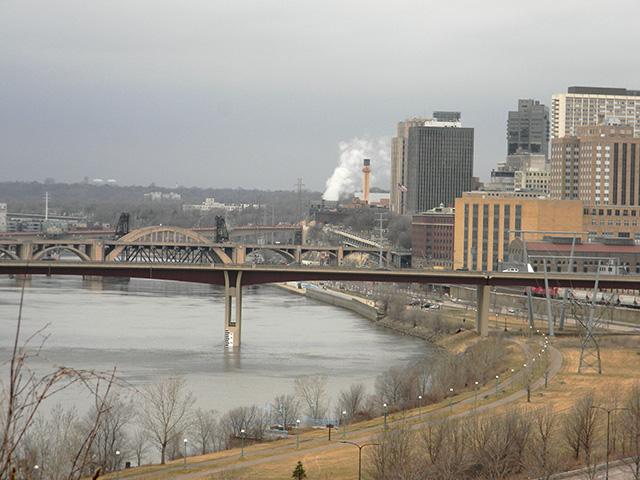Cash Market Moves
Upper Mississippi River Closed for Winter; Lower Mississippi Falling Again
The last tow of 2022 left the far Upper Mississippi River and made its way south over the weekend of Nov. 25. Traditionally, the last tow departing St. Paul and heading south of Lock and Dam 2, near Hastings, Minnesota, marks the unofficial end of the navigation season in the UMR.
U.S. Army Corps of Engineers, St. Paul District, started closing four locks and dams on Nov. 1 for routine winter maintenance, ending the 2022 navigation season. The St. Paul District maintains a 9-foot navigation channel and 13 locks and dams from Minneapolis to Guttenberg, Iowa.
Lower St. Anthony Falls lock and Lock and Dam 1, in Minneapolis, Minnesota, was closed for the navigation season to commercial and recreational vessel traffic on Tuesday, Nov. 1. Locks and Dams 3, Welch, Minnesota, and 4, Alma, Wisconsin, will close to commercial and recreational vessel traffic on Monday, Dec. 5, through Sunday, March 12, 2023, for miter gate anchorage bar replacement, noted the Corps on their website.
Given that Lake Pepin freezes in the winter, no traffic can transit that part of the river until the spring thaw. Pepin is the largest lake on the Mississippi River and is part of Pool 4 which extends from Lock and Dam 3 near Red Wing, Minnesota, to Lock and Dam 4 downstream at Alma, Wisconsin.
Other locks on the Mississippi River will also eventually close for navigation as the Corps gets busy with winter lock maintenance. Locks 12, 13, 15 and 19 in the Rock Island District will be closed by Jan. 3, 2023, until spring and Locks 21 and 22 will close by Jan. 13, 2023, until March 2023.
P[L1] D[0x0] M[300x250] OOP[F] ADUNIT[] T[]
LOWER MISSISSIPPI FALLING AGAIN
After a few weeks of reprieve from extremely low water and barge groundings, thanks to Tropical Storm Nicole, river levels are falling back again.
Even with the help from Nicole, rivers remained low, but all were operational with few to no groundings reported. Barge drafts were increased around Nov. 11 for northbound and southbound traffic from 9 ft. to 9 ft., 6 inches, with plans to keep it that way through Thanksgiving.
If water levels continue to fall, it is likely that barge drafts could be reduced to 9 feet again; but for now, in the Lower Mississippi River, they are still at 9 ft 6 inches. As dredges continue to work in the Lower Mississippi River, that will help keep a channel open in the middle of the river.
The St. Louis Harbor was able to get above zero gauge and is hovering at 1 foot above zero gauge on Nov. 28. The National Weather Service (NWS) in St. Louis is forecasting chances for rain on Nov. 29, and water levels are forecast to hang slightly above zero gauge until Dec. 3 when levels fall below. If no more rain falls, the river at St. Louis is expected to be at -2.7 feet below zero gauge by Dec. 10.
After finally rising above zero gauge for about 10 days, the Mississippi River at Memphis fell to -3.95 feet on Nov. 28. According to the NWS of Memphis, severe weather is expected Nov. 29, bringing numerous strong to severe thunderstorms lasting into the early morning hours on Wednesday. Should that forecast hold true, the river levels will reach -3.3 feet and then start to fall again the week of Dec. 5, reaching -8 feet unless more rain comes.
DTN Ag Meteorologist John Baranick noted on Nov. 28, that scattered showers moved through the Lower Mississippi River area over the weekend and the Delta region is staying active with several fronts moving through. "Scattered showers accompany the fronts, but are also falling farther north, which will add water to the river system. A boost in water levels is forecast for later this week and weekend before falling again next week. However, if the pattern can stay active, forecasts are likely to keep bouncing around," said Baranick.
Tom Russell, Russell Marine Group, said, "Bursts of precipitation will provide only temporary rises that flush through and fall again rather quickly. It is estimated the fix will require 40 to 60 days of 'normal' precipitation to provide full recovery. Tow size restrictions will likely remain at 25 barges and rebalancing will be greatly assisted once river depths and widths improve to levels where tow sizes can return to usual 35-40 barges."
Mary Kennedy can be reached at mary.kennedy@dtn.com
Follow her on Twitter @MaryCKenn
(c) Copyright 2022 DTN, LLC. All rights reserved.




